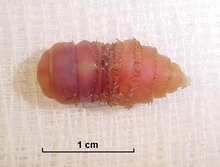Tomorrow, June 21, 2013, marks the first day of summer. Most horse owners are aware of the demands that warmer summer weather brings, but some owners may not be aware that this is prime time for bot flies and other pests and parasites to make a horse's life miserable.

Larval stage of the horse bot fly
If not removed, bot eggs hatch and larvae burrow into the gums and tongue before migrating to the stomach where they damage the lining causing colic and other health issues.
© 2013 by Kalumet
Summer is the time of year when bot flies are maturing and beginning their cycle of laying eggs on horses. The flies do not bite, but the egg laying can be annoying to the horse and the consequences of insufficient prevention of bots can lead to internal parasites that affect the horse's health.
Three species of bots are considered serious pests to horses. The bot is the larval stage of the horse bot fly, Gastrophilus species. Bot fly species vary in where they lay their eggs on the horse and how the eggs hatch.
In general, bots lay eggs on the forelegs, shoulders and lips during the summer and fall. Where the eggs are laid describes the three species: common bot fly, chin bot fly and nose bot fly.
The yellowish bot eggs can be scraped or clipped from the horse’s hair before they hatch. The eggs and clippings should be swept up and disposed of away from feeding areas.
Some veterinarians recommend spraying the horse with warm water which will cause eggs to hatch, allowing the small larvae to be killed before they enter the mouth.
If not removed, the eggs hatch when the horse licks and rubs them. Once in the mouth, the small bots burrow into the gums and tongue where they remain for about one month and then migrate into the stomach. Upon entering the stomach, the larvae attach themselves to the mucus membrane and remain there for the next eight to 10 months.
They detach themselves in the spring and pass through the feces. Once outside the host, the larvae pupate. Mature flies emerge in four to six weeks. The flies mate, the adult females lay eggs, and the cycle begins over again.
The flies do not bite, but egg-laying is annoying to the horse. The principal damage caused by the bot is to the stomach lining. In extreme cases, bots can cause a stomach rupture or fatal colic if they block the stomach valve to the small intestine.
Your veterinarian is your best source for drugs available for internal parasite control. Ivermectin is often the de-worming drug of choice in fighting bots, but horse owners should be sure to follow the directions on the label before using it.
Your veterinarian can give you additional information about how to deal with bots in your area.
